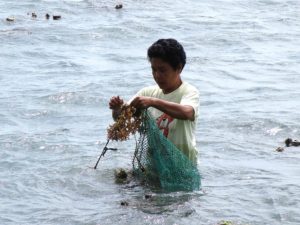 SEAWEED FARMING PROVIDES BENEFITS FOR WOMEN AND COMMUNITIES
SEAWEED FARMING PROVIDES BENEFITS FOR WOMEN AND COMMUNITIES
18 October | Bangkok: Research into seaweed farming in the Philippines and Zanzibar has revealed new insights, with women’s involvement in the sector providing a vital source of household income and new production technologies showing promise for women’s empowerment, livelihoods and the environment.
These findings related to seaweed culture will be the focus of two presentations at ‘Expanding the Horizons’, the 7th Gender in Aquaculture and Fisheries conference in Bangkok on 18-22 October.
The presentation on 20 October led by Caridad N. Jimenez, Associate Professor 7 of the College of Fisheries and Ocean Sciences, University of the Philippines Visayas Seaweed Farming in Western Visayas: Strengthening the Roles of Women will discuss a study into the roles and perceptions of women in seaweed farming.
“In the Philippines, more women than men work in seaweed farms. For some families, the men of the house do the staking of the posts, but it is still majority of the women who do the tying of the longlines and the monitoring activities. Yet, many women see this as just part of their role as a wife and mother, often not giving any monetary valuation to their work contribution. In fact, seaweed farming is a major source of income for the family/household and the community, especially with the decreasing catch from capture fisheries.”
“These findings underscore the need to formulate better and more appropriate strategies for gender acceptance in coastal communities. Likewise, more values orientation for both women and men can help to raise and/or enhance their awareness of the contribution of each sector and recognize the vital contributions of women’s roles,” she said.
On 18 October, in Women’s Empowerment through Improved Seaweed Farming Technology: The Story of “Sea PoWer” In Zanzibar, Dr. Cecile Brugere, director, Soulfish Research and Consultancy, will present research findings on an innovative seaweed production technology.
“The goal of Sea PoWer is to simultaneously address seaweed productivity challenges through the introduction of tubular nets to farm seaweed and enhance women’s empowerment through the gender-sensitive promotion of the innovation. The research focused on Zanzibar, which is the second largest producer of seaweed globally and where 80 percent of the producers are women.
“After two years of testing, the technology is showing promise for women’s empowerment, livelihoods and the environment. Our research found that the tubular nets enhanced the growth and productivity of higher value seaweed strains, generated income and strengthened the links between women producers.
“When introducing new technologies to women¾yet still very vulnerable and with little voice¾it must be done hand-in-hand with individual capacity and social capital building to prevent the unexpected consequences of technology introduction. Alongside this, capacity building and engagement with men and community members must be pursued for greater gender equality,” she said.
Media contact: Kate Bevitt, katebevitt+oak@gmail.com

